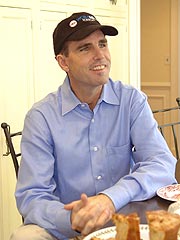You may not know it to look at me, but I am an enemy of religion.
Well, some people say that anyway, based on two simple facts: I'm agnostic, and I believe the government should stay as far away from religious speech as it can.
This seems to be a sectarian version of "if you're not with us, you're against us." To true believers even a declared neutral on religion is an adversary. By such logic, there is no such thing as neutral. "Neutrality" is simply code for "doesn't support", which of course means "opposes."
That may be helpful when trying to construct an "us against the heathen hordes" mindset, but it doesn't really comport well with reality. I send my children to Lutheran preschools; I have written frequently about Abdul Rahman, and will write about other religious freedom cases in the future; I strongly support individual religious liberty. I respect the role of religion in society. I have tossed change into Salvation Army kettles.
I just happen to think that religion is not a government concern. It's one of a whole host of things -- like, say, clothing styles -- where government should not have a role. As citizens, we all have a right to practice our religion as we see fit. What we do not have is the right to use the government to promote our religion.
An agnostic who supports religion
I was raised Presbyterian, so I have more than a passing familiarity with Christianity. But I'm an agnostic for the classic reason: I don't believe the existence or nonexistence of God can be proven, so why waste time on an unsolvable puzzle? It's fun to noodle on, but not really worth the investment of serious study. If He exists, great. If He doesn't, okay. I guess I'll find out when I'm dead.
Same thing with "Is there an afterlife?" Nobody knows, so any attempt to reason it out or "prove it" inevitably devolves into finding an explanation that is comforting to you. I sincerely hope there is an afterlife, and we all owe religion a "thank you" for coming up with the concept; but believe in it? Can't do it.
Does that mean I think believers are gullible, easily deluded saps? Hardly. Just because they cannot prove to me that God exists doesn't mean that they have not had His existence proven to their own satisfaction. Perhaps they've had a personal experience with God. Perhaps they see God's presence in the structure of the world around them. Who am I to say they're wrong?
So though I'm agnostic, I'm not hostile to religion. We discuss religious topics with our children, including the main tenets of the major religions. Why? Because I want my children to be able to make their own religious choices. As they get older we'll discuss religion in greater detail, even take them to church/synagogue/temple if they want. I see my role as providing information, not telling them what to believe.
Government, belief, and public policy
I think people should be free to worship as they please. And I respect religion's role in society. Why, then, do I think government should be studiously neutral on religion?
Two reasons: public policy must have a rational, logically defensible basis; and government is for all people, not just the adherents of any single religion or group of religions.
Public policy: Personal, untestable, unprovable beliefs have no place in formulating government policy. As an individual, I'm free to believe that redheads are agents of God's evil twin. Does that give me the right to enact anti-redhead laws? Not in a country that respects individual rights. In order to discriminate against a group or behavior, I must mount a logical public-policy case for doing so. Religious belief may inform my views as a voter or a legislator, but it cannot by itself be a basis for law.
Government for all people: If the government expresses a preference for certain religions, it is by necessity excluding those who believe differently. Our government belongs to all of us, in all our myriad beliefs or nonbeliefs; and thus it should not express a preference for any particular religion.
Blue laws -- which force businesses to close on Sundays -- are a perfect example of laws with no rational reason for existing, and which put government muscle behind one particular religion. If you don't believe in working on the Sabbath, then don't -- but don't use the government to force everyone else to take the day off, too.
Does this mean I'm trying to push religion out of the public square? No. Because individuals are free -- nay, encouraged -- to keep religion in the public square. Only the government should remain neutral and silent.
An analogy: If I don't want cars driving on the sidewalk, am I anticar? No. I just believe they belong on the road, not on the sidewalks. Similarly, religion belongs in individual discourse, not government discourse.
There are gray areas, of course. Religion should not be discriminated against, either. Religion plays a role in our society; its contribution can be recognized and acknowledged by the government just like the government recognizes the contributions of other groups. But the emphasis should be on recognizing the contribution, not the religion.
This, by the way, is why I generally support Bush's push to make faith-based organization eligible for government grants. Religious groups should be treated just like everybody else; they should receive neither favorable nor unfavorable treatment merely because they are religious.
As the above example demonstrates, trying to find the proper place for religion in a religiously diverse society is not an "attack on God." It's common sense, the accomodations that allow us to coexist peacefully with our neighbors as equal citizens.
Religious issues
Being agnostic, or defending everyone's right to believe what they want, doesn't mean I lack opinions on religious issues. I frankly enjoy religious discussions because of the big questions they raise. But these are debates about the shape of religion, not its existence.
For example, I'm not a huge fan of organized religion. Organized religion is all about claiming stewardship of the One True God. Since that's an unprovable claim on the face of it, they have to resort to secondary measures to attract and keep a following. Eventually the church's continued existence becomes an end in itself -- an end that while not totally separate from honoring God is at least distinct from it.
The whole concept of Hell is a great example. Many religions claim something along the lines of "we are the one true faith; believe in us or suffer for all eternity." This has always struck me as a transparent organizational tactic, not something that God would do. What kind of God would create a world that contains thousands of religions, and then say to each of us: "Pick wisely, because only one of them will get you into heaven"? If that is indeed the kind of God we have -- petty and sadistic -- then I for one choose not to worship Him even if He exists. No God worth the name plays shell games with people's souls.
I choose to believe that if there is an afterlife, and the entrance requirement is based on what you do on earth, then the criteria will be things like living a good, honorable life, regardless of what particular creed you subscribe to.
(To be fair, I think the common depiction of Hell is a distortion. The most reasonable definition of Hell I've come across describes it simply as "the absence of God." That's simply a truism: If I don't believe in the Christian God, then when I die I will not go to the Christian heaven. It does not imply, however, that Hell is unpleasant: fire, brimstone, devils, demons. And it leaves open the possibility of me going to a different heaven, or the Elysian Fields, or Limbo, or whatever. Or being reincarnated.)
Or you can get into a discussion of why we should worship God. Doing so voluntarily out of simple joy or gratitude makes sense. But few religions present worship as merely an option; it's the whole point, and often demanded by the God in question. Yet it seems to me that any God worth having wouldn't care a whit about being worshipped, and thus Gods that demand worship probably don't deserve it.
Is evolution opposed to God? Only if you think that God couldn't have chosen evolution as one of the mechanisms of creation. Is science opposed to God? No; science looks at the how of things, not the who or the why behind it. It's only a conflict if your faith requires belief in easily disprovable things.
The questions go on and on. They're great; they're interesting; they make us think. They are why religion exists: to try to tackle the big questions, explain the unexplainable. It's an ambitious undertaking, and it produces some first-class philosophy. And the redemptive power of religion has transformed lives and societies.
That is what religion does for us, and why it is valuable.
But religion, like any social tool, can also be used for ill. The religious wars that wracked Europe, the Crusades, the Inquisition, witch burnings, Islamic terrorism, militant Jewish settlers -- all show belief being twisted to bad ends. And it usually occurs when one religion gains undue influence in secular government and starts using that government to further its own agenda.
So let each religion compete in the public marketplace of ideas. Let us build a society that knits together fervid and disparate beliefs into a vibrant whole. But let us agree that for any of us to be free, all of us have to be free. And that means keeping the government out of religion. For the government that today promotes your religion can tomorrow suppress it -- and society will be the poorer for that.
church and state, establishment of religion, religion, politics, midtopia






